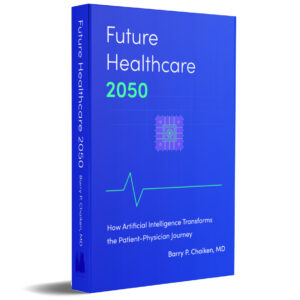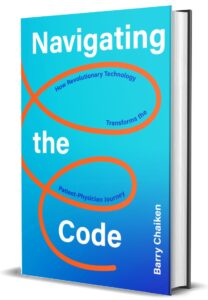Books by Barry P. Chaiken, MD
Author Signed Deluxe Copy
In Future Healthcare 2050: How Artificial Intelligence Transforms the Patient-Physician Journey, Barry P. Chaiken, MD presents a compelling vision of how artificial intelligence will revolutionize healthcare delivery over the next quarter century. His unique perspective offers profound insights into the vast potential and significant challenges that lie ahead.
This groundbreaking work transcends the typical AI hype by providing a practical roadmap for healthcare organizations navigating this technological revolution. Dr. Chaiken adeptly translates complex concepts into actionable insights, exploring how AI will enrich clinical decision-making, streamline operations, and enhance patient outcomes, all while addressing vital concerns about privacy, security, and the preservation of human judgment in medical care.
From the fundamentals of healthcare AI to advanced applications in clinical practice, the book provides a comprehensive exploration of how these technologies will reshape every aspect of healthcare delivery. Dr. Chaiken draws on his extensive experience implementing healthcare technology to provide invaluable guidance on building effective teams, managing change, and maintaining focus on patient care throughout the digital transformation.
What sets this book apart is its balanced approach to AI implementation. While celebrating AI’s potential to revolutionize healthcare, Dr. Chaiken never loses sight of the essential human elements that define quality medical care. His insights on maintaining trust, ensuring ethical deployment, and fostering collaboration between clinicians and technology experts provide a practical framework for successful AI adoption.
Whether you are a healthcare executive strategizing AI initiatives, a clinician curious about the impact of these technologies on patient care, or a technology leader driving AI implementation, Future Healthcare 2050 equips you with the strategic understanding and practical guidance necessary to excel in healthcare’s AI-enabled future.
Also available as an eBook on Nook and Kindle and online at Barnes and Noble and AmazonPart I explains the depth and breadth of healthcare’s problems worldwide, then its issues with technology, change, and business management;
Part II presents RHIT as the essential tool for change management and the transformation that accrues from its implementation;
Part III develops a deeper, more encompassing understanding of change management for creating an integrated workflow for clinicians, patients, and the business;
Part IV explores the application of RHIT and its transformational impact on the Hippocratic Code of quality, access, outcome,s and financial investment by both the patient and the provider; and
Part V draws everything together in two chapters: the marriage of economics and interoperability and the emerging connected, adaptive healthcare organization.
Also available on Nook, Kindle and Audible
